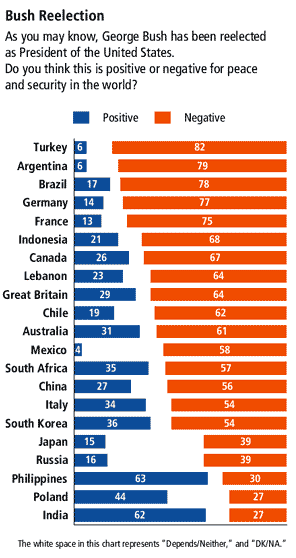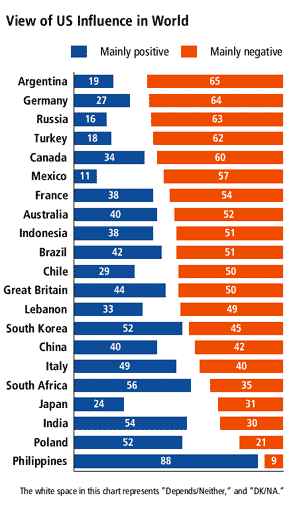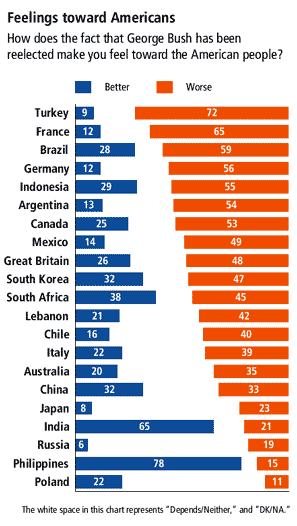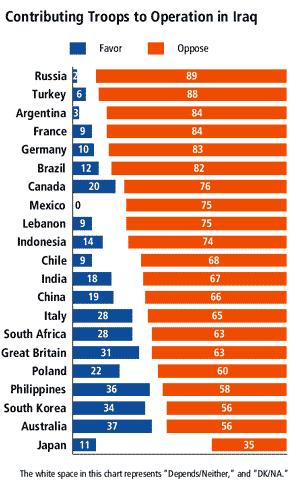|
Global Poll: Most See
Bush's Reelection as Negative for World
Security
PIPA January 2005 • India, Philippines and Poland See Bush's Reelection as Positive • • Substantial Minority Now Feels Worse Toward American People • • More See US Influence in World as Negative Than Positive • • No Country Supports Contributing Troops to Iraq • 
According to a new BBC World Service Poll of twenty-one countries from all regions of the world, the reelection of President Bush is seen as negative for world peace and security by a majority in sixteen countries and a plurality in another two. On average across all countries, 58 percent said that Bush's reelection was negative, while 26 percent said that it was positive for global security. The most negative countries are western European, Latin American and Muslim ones. The only three countries in which a majority or plurality see Bush's election as positive are the Philippines (63%), India (62%), and Poland (44%). The poll of 21,953 people was conducted by the international polling firm GlobeScan together with the Program on International Policy Attitudes (PIPA) at the University of Maryland. The poll also finds that for a substantial minority worldwide these negative feelings about Bush have generalized to the American people. Asked how Bush's election has affected their feelings toward the American people, on average, 42 percent said it made them feel worse toward the American people, while 25 percent said it made them feel better and 23 percent said it had no effect. Countries varied widely. In seven countries clear majorities said that it made them feel worse—especially Turkey (72%), France (65%), Brazil (59%) and Germany (56%). In only two did a majority say it has made them feel better (the Philippines 78% and India 65%). In three countries most said that it has had no effect on their feelings toward the American people — Russia (66%), Japan (62%), and Poland (55%). 
Clearly the negative attitudes toward Bush are not simply derived from anti-Americanism as negative attitudes toward the US, while significant, are not as strong as for Bush. On average a plurality of 47 percent say they now view US influence in the world as mostly negative while 38 percent view it as mostly positive and 15 percent did not answer either way. In twelve countries a majority see US influence as mostly negative, with large majorities in Argentina (65%), Germany (64%), Russia (63%), Turkey (62%), Canada (60%), and Mexico (57%). Though France is often presumed to be overwhelmingly anti-American, only a modest 54 percent majority said they viewed US influence as negative. Majorities see US influence as positive in the Philippines (88%), South Africa (56%), India (54%), Poland (52%), and South Korea (52%). Asked how they now feel about contributing troops to Iraq, not a single country has a plurality or majority in favor. On average, 70 percent are opposed, which includes 27 percent who said that Bush's election made them feel more opposed. Interestingly, even in the Philippines and Poland—countries that express positive feelings toward Bush and have contributed troops to the operation in Iraq—majorities are opposed (Philippines 58%, Poland 60%). The only country in which opposition is less than half is Japan (35% opposed), but 54 percent declined to answer the question and only 11 percent were in favor. The highest opposition is in Russia, at a near-unanimous 89 percent. 
Steven Kull, director of PIPA, comments, "This is quite a grim picture for the US. Negative feelings about Bush are high and are generalizing to the American people who reelected him. And, support for contributing troops to Iraq is nowhere to be found. However, those saying the US itself is having a clearly negative influence in the world still do not constitute a definitive world-wide majority, suggesting there may be some underlying openness to repairing relations with the US.' Doug Miller, President of GlobeScan, comments, "Our research makes very clear that the reelection of President Bush has further isolated America from the world. It also supports the view of some Americans that unless his Administration changes its approach to world affairs in its second term, it will continue to erode America's good name, and hence its ability to effectively influence world affairs.' Some of the countries most negative about Bush's reelection are traditional US allies. These included all western European countries polled—Germany (77% negative), France (75%), Britain (64%), though Italy was relatively moderate at 54 percent negative. Also quite negative were Canada (67%) and Australia (61%). Japan, however, was again somewhat noncommittal (positive 15%, negative 39%, no difference 31%, don't know 15%). Countries with predominantly Muslim populations are also quite negative. In Turkey, though a US ally, an overwhelming 82 percent were negative about Bush's reelection—the highest of all countries polled. Also negative were Indonesia (68%), and Lebanon (64%). Given that Latin America has had less direct involvement in the foreign policy issues of the first Bush term, it is striking how negative public feelings are toward Bush there. Argentines were 79 percent negative, as were 78 percent of Brazilians, 62 percent of Chileans and 58 percent of Mexicans. The most mixed region is Asia. As mentioned, a large majority of Filipinos (63%) and Indians (62%) feel positive about Bush's reelection, while the Japanese were noncommittal. However the majority of Indonesians (68%), Chinese (56%) and South Koreans (54%) are negative. 
In the one African country polled, South Africa, a majority (57%) is negative. Russians lean negative (39% negative to 16% positive) but, similar to the Japanese, nearly half either said Bush's reelection made no difference to them (32%) or gave no answer (14%). Globally, demographic variations are modest. Those with higher education and higher income are a bit more likely to have negative feelings about Bush's reelection and to feel worse toward the American people. Women and those with higher incomes are a bit more likely to oppose sending troops to Iraq. Among all countries polled that currently have forces in Iraq, in no case was there majority public support – something potentially problematic for the Iraq operation. Majorities oppose contributing troops in Italy (65%), Britain (63%), Poland (60%), Australia (56%), and South Korea (56%). Once again Japan was more noncommittal with a plurality of 35% opposed, but a notable 54 percent not answering the question. In addition to the 21 countries polled, a poll of 1,000 Americans was conducted. Not surprisingly 56% of Americans expressed the view that Bush's reelection is positive for world security (negative 39%) and 71% said that the US is having a mostly positive influence in the world (25% mostly negative). Polling was conducted from November 15, 2004 to January 3, 2005 with of 21,953 people, plus 1,000 Americans. In eight of the countries the sample was limited to major metropolitan areas. The margin of error per country ranged from +/-2.5 – 4%. For more details, please see the Methodology section or visit www.pipa.org. Commentary: |
|